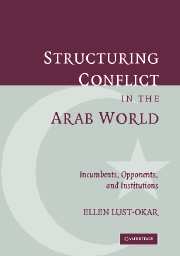Book contents
- Frontmatter
- Contents
- List of Figures and Tables
- Acknowledgments
- A Note on the Use of Language
- Abbreviations
- Introduction
- 1 The Manipulation of Political Opposition
- 2 Structures of Contestation
- 3 Playing by the Rules: The Inclusion and Exclusion of Political Oppositions
- 4 Dynamics of Opposition in Unified SoCs
- 5 Opposition Dynamics in Divided SoCs
- 6 Formal SoCs and Informal Political Manipulation
- Conclusion
- Appendix: Political Forces in Egypt, Jordan and Morocco
- Notes
- Bibliography
- Index
Introduction
Published online by Cambridge University Press: 22 September 2009
- Frontmatter
- Contents
- List of Figures and Tables
- Acknowledgments
- A Note on the Use of Language
- Abbreviations
- Introduction
- 1 The Manipulation of Political Opposition
- 2 Structures of Contestation
- 3 Playing by the Rules: The Inclusion and Exclusion of Political Oppositions
- 4 Dynamics of Opposition in Unified SoCs
- 5 Opposition Dynamics in Divided SoCs
- 6 Formal SoCs and Informal Political Manipulation
- Conclusion
- Appendix: Political Forces in Egypt, Jordan and Morocco
- Notes
- Bibliography
- Index
Summary
Authoritarian leaders are seldom expected to play by the rules. In the prevailing wisdom, autocracies are characterized by unique leaders with different agendas, supported by slightly broader or narrower coalitions and justified through varied institutional façades. Thus, to understand authoritarian politics, we focus on the leaders – distinguishing the personalities and backgrounds of Stalin, Mao, Peron, and Castro; we contrast the foreign and domestic policies of Nasir and Sadat, Stalin and Khruschev; and we examine the differences between personalistic dictators, military juntas, and various forms of one-party states. However, in marked contrast to studies of democracies, which carefully distinguish parliamentary and presidential systems, analyze electoral rules and even sometimes the finer points of voter registration, we largely ignore formal institutions in authoritarian regimes. Even those turning their attention once again to competitive authoritarianism or “hybrid regimes” have dismissed formal institutions, arguing that institutions “are often weak and therefore easily manipulated or changed by autocratic incumbents.”
Yet, formal institutions matter in authoritarian regimes. They do so independently of the larger “rules of the game” that characterize “regime types.” They do so with regard to political participation, and they do so even in the Middle East, a region in which institutions are perhaps voted least likely to count. Authoritarian elites use institutional rules to create and maintain very different relationships between the state and political opponents and among various opposition groups themselves.
- Type
- Chapter
- Information
- Structuring Conflict in the Arab WorldIncumbents, Opponents, and Institutions, pp. 1 - 21Publisher: Cambridge University PressPrint publication year: 2005

